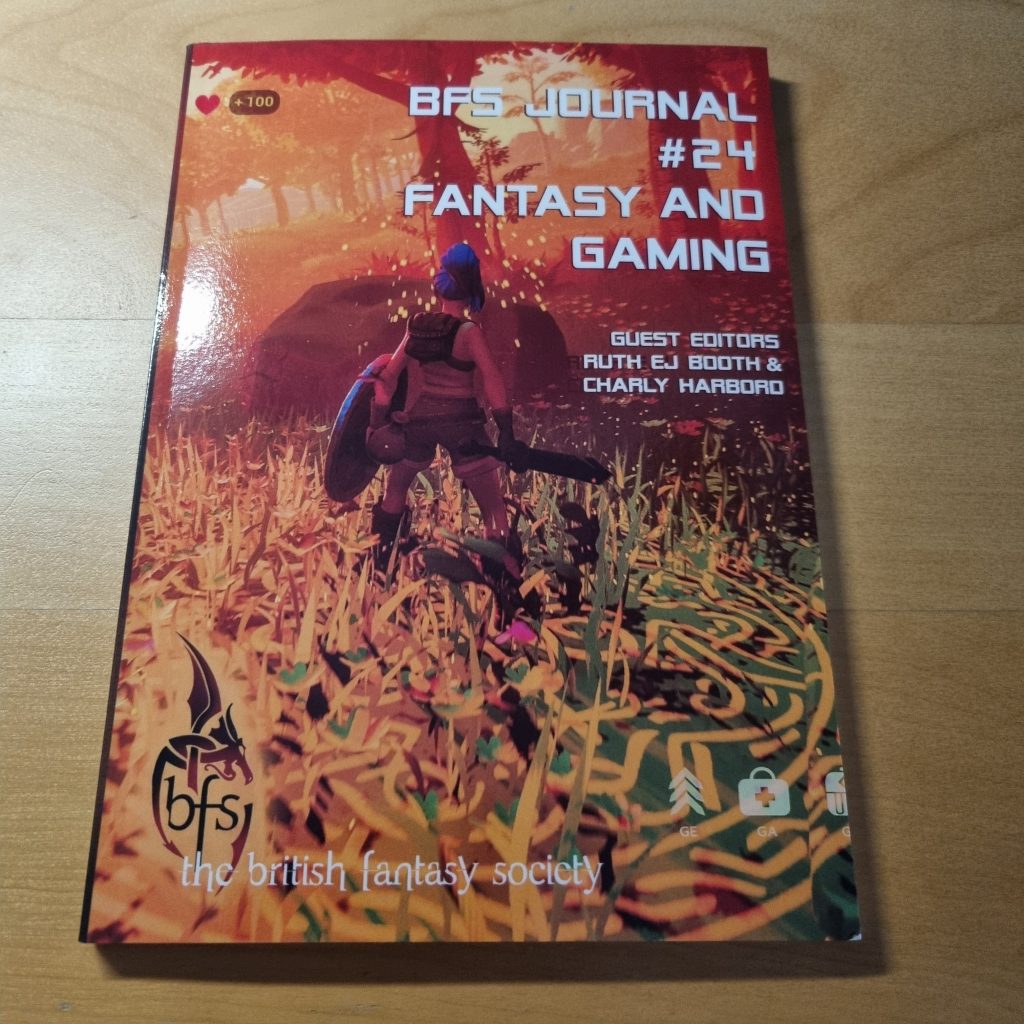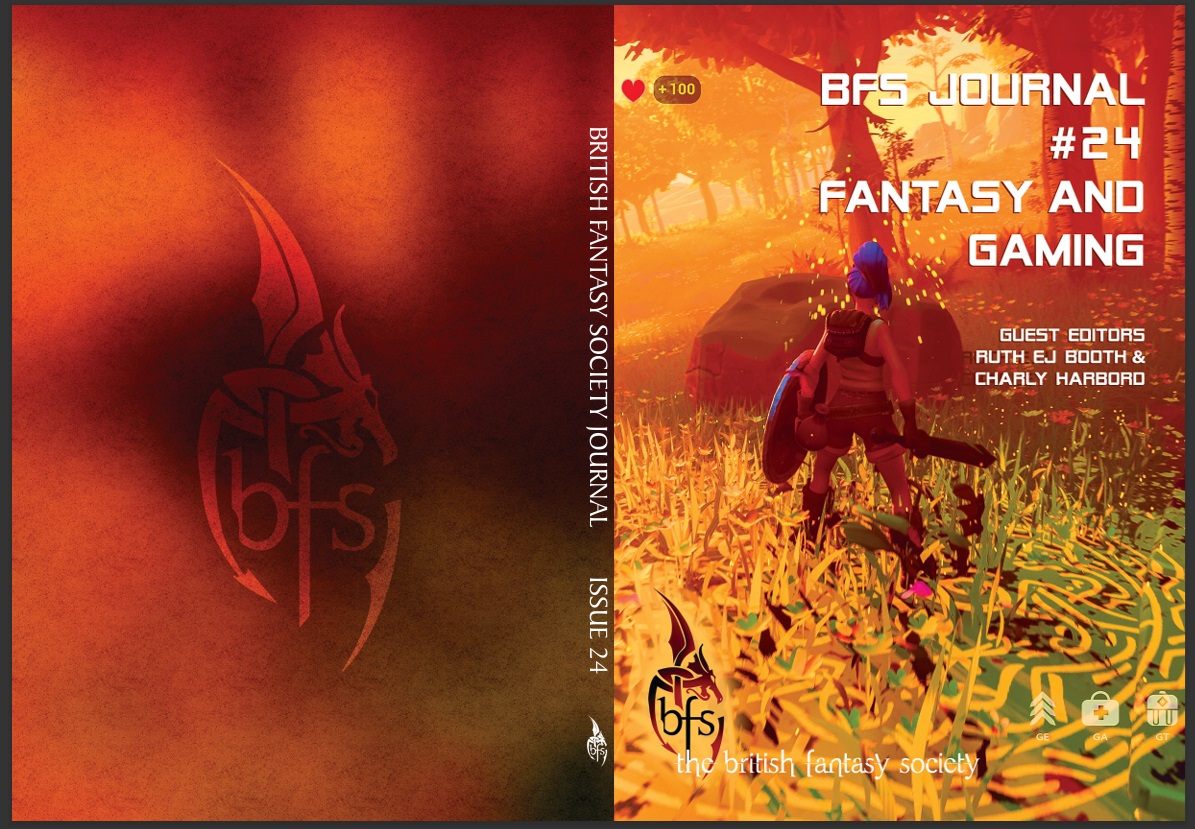Time for some non-fiction housekeeping! It’s been a busy last few months, so the next couple of entries will be about things that came out in the middle of all that. In this first blog, let’s cover the BFS Journal special issue on Fantasy and Gaming, which I co-edited with Charly Harbord for the British Fantasy Society.
Fantasy and Gaming is a special issue of the BFS Journal, first conceived when the BFS Chair Shona Kinsella approached me asking if I’d be interested in editing an issue while they were between Journal Editors. Naturally, I was pretty flattered, as well as glad of the chance of grabbing some extra credits for my PhD. However, I didn’t intend for this to be a purely academic exercise. In these first conversations with Shona, I spoke of how I wanted this issue to be aimed at all members of the BFS, with informative and insightful articles from fans and academics from videogaming, to tabletop games, to adventure role-playing books. Settling on the title of Fantasy and Gaming, I got to work.
With my father’s terminal illness in mind, I knew I needed two things: a firm work schedule, and a co-editor to help with the load. So, I decided to approach my colleague and sister-in-gaming Charly Harbord. I first met Charly through a university friend when I was co-organizing Shoreline of Infinity’s Digital Wor(l)ds event back in 2020. Charly’s credits not only include work with Global Game Jam, Women In Games, Outwith Reality and a PhD on language acquisition through gaming, but also work with indigenous creators to preserve and develop their cultures through their games. Charly would end up not only being co-editor, but my rock throughout this process. It’s thanks in large part to her hard work and invaluable advice that the issue ended up being as inclusive and welcoming as it is.
Helping people make their work the best they want it to be is one of my favourite things. I’ve previously co-edited zines and university journals, as well as critiqued work and mentored writers, and it’s a joy to see them blossom as they discover their voice. While this makes an agony of the selection process, it also makes the subsequent editing process an utter delight. I love finding new favourite writers, and there are plenty to discover here, from Eastern Europe to across the US.

While a full listing of the issue would be a bit dry, here’s what you can find inside, taken from our Editorial for the issue.
For many of us, Fantasy games were a formative experience, from adventure gamebooks, as Daniel Pietersen explores in ‘“Your Adventure Begins Here”: A personal history of The Warlock of Firetop Mountain’, to Japanese roleplaying games (or JRPGs), as in Adri Joy’s nostalgic exploration, ‘(Re)play Your Destiny: Branching Narratives and Character Development in Fire Emblem: Three Houses’. Games mean different things to players over time, as Mary Berman illustrates in ‘Nostalgia, But Make It Stressful’, her recollection of playing Fantasy games as a pressure valve in Grad School.
Such liminal escapism has always been a core part of Fantasy. Gaming offers an unparalleled depth of engagement with not just the fantastic worlds we love, but also the one around us. Gabriel Elvery explores how roleplaying can be an act of self-discovery that allows us to reflect on both our own gender identities and on the behaviour of others, in ‘Roleplaying Realities in Digital Fantasies’. Games allow us to not just explore, but embody potential approaches to life and even existence. In ‘Heraclitus’s philosophy as a manual for the Dark Souls computer game series’, Nikita Stulokov demonstrates how these games embody the Greek philosopher’s writings on knowledge and the nature of the soul.
For creators, Games offer opportunities to collaborate and elevate their stories. Susan York reminisces on developing her acting skills in Fallout: New Vegas’s celebrated mod Mojave Express Delivery in ‘Voice Acting For Mods: A Retrospective View’. Elsewhere, Blair Smith explores how the art of Warhammer 40,000 is core to its political satire in ‘A Very British Darkness: How Illustration Charted The Destiny of Warhammer 40,000’. Indeed, as C.D. Brown shows in ‘Reading the Rules: Style and Usage in Advanced Dungeons & Dragons’, games offer an unprecedented opportunity for creators to transcend the expectations of a form – including the games manual itself – luring players in with an evocative call to arms.
As Brown’s article also notes, games are not always welcoming spaces for all Fantasy fans, and we are in the midst of massive changes in that respect. Beatrix Livesey Stephens shows in ‘Combat Wheelchairs, Service Mimics, and You: Homebrew Disability Representation in Tabletop Roleplaying Games’ that fan communities have driven great strides in diverse gaming. And Michelle Franklin finds that games like Elden Ring are starting to follow suit in ‘How Women Drive Destiny’. If evidence were needed of the importance of thoughtful representation, Rebecca Gault’s exploration of LGBTQIA+ storytelling in ‘Regency Representation In A Court of Fey and Flowers’ is a hymn to its power.
However, there is much to be done by the games industries before we can expand the horizons of Fantasy together. That’s why we’re delighted to feature Brandon Brown’s interview with Austin Walker from TTRPG show Friends at the Table, talking about developing more inclusive, critical worldbuilding spaces in collaboration. Elsewhere, Stewart Hotston, author and co-owner of Curious Pastimes, brings a unique perspective on the field, examining the potential ways in which LARP can open up to people of colour by expanding beyond faux-European defaults in ‘LARP, Whiteness and Fantasy’.
This issue is a bit of an odd one to talk about because Charly and I finished editing this issue way back in Spring 2023. Unfortunately, there were a number of issues on the production side at the BFS that caused significant delays. However, Horizons editor Pete Sutton and (the recently British Fantasy Award-winning) Flame Tree Press‘ Nick Wells stepped in at the last minute to help out, and it’s thanks to their hard work the issue is now available to members of the British Fantasy Society.
It’s been a long time coming, and I hope it’s been worth the wait.

